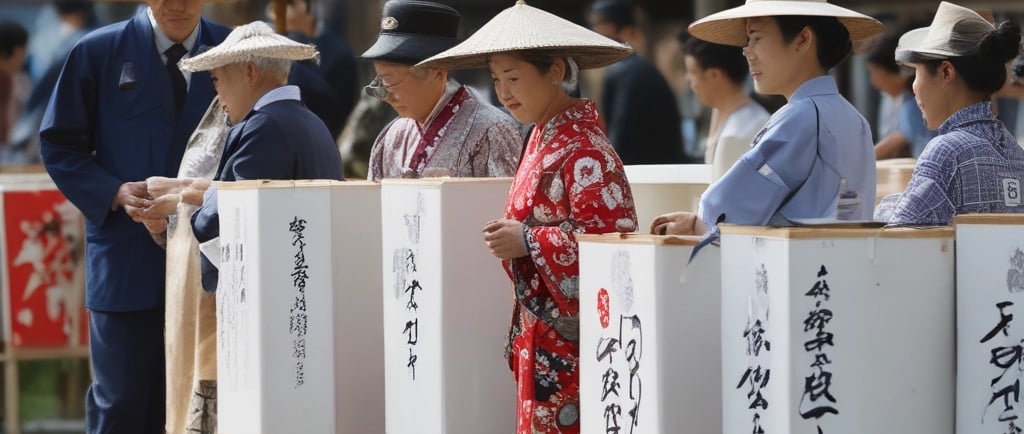Elections Right Now
Your Global Election Tracker.
Join our mailing list for updates and analyses on future elections.
July 2025 - Growing prices threaten the Japanese government
Japan elects its new parliament members on July 20, 2025. Increasing cost of living is a challenge for many voters and the current minority government of Prime Minister Ishaba.
Editor
7/18/20254 min read


July 2025. Tokyo, Japan: Japanese voters will head to the polls on July 20, 2025, for a crucial House of Councillors election. This will be the feedback of society on the fragile minority government of Prime Minister Shigeru Ishiba and his ruling Liberal Democratic Party (LDP). Against a backdrop of economic uncertainty, shifting regional power dynamics, and pressing domestic issues, the outcome of this election will have significant repercussions for Japan's future trajectory home and on the global stage.
This election for the upper house of the National Diet comes at a precarious time for the LDP, which has seen its public support wane following a political funding scandal and a challenging economic climate.The party's performance will be a critical indicator of its ability to maintain its grip on power and advance its policy agenda.
Economic policy tested by election
At national level, the Japanese July 2025 election becomes a judgment on Prime Minister Ishiba's leadership and his government's handling of the economy. Appointed in September 2024, Ishiba has navigated a difficult political landscape with a minority government, struggling to build consensus and push through key legislation.
The primary concern for many voters is the state of the economy. Japan continues to grapple with the effects of rising inflation, a depreciating yen, and stagnant wage growth, which have squeezed household budgets. The Ishiba government's economic policies, including its strategies to combat rising living costs, will be under intense scrutiny.
Another pivotal national issue is the government's approach to national security. In an increasingly volatile East Asia, with China's growing military assertiveness and North Korea's continued missile development, Japan's defense policy is a key topic of debate. The government's plan to significantly increase defense spending has been met with mixed reactions from the public and opposition parties, highlighting a deep national conversation about the country's security posture.
The LDP's standing has also been damaged by a recent political funding scandal, which has eroded public trust in the ruling party. This has created an opening for the main opposition party, the Constitutional Democratic Party (CDP), and other smaller parties to challenge the LDP's dominance.
Aging society and increased migration concerns the voters
The recent Tokyo metropolitan assembly election has sent a clear warning signal to the LDP. The party suffered a significant setback, losing its position as the largest party in the assembly to Tomin First no Kai (Tokyoites First), a party with strong ties to popular Tokyo Governor Yuriko Koike. This result underscores a growing dissatisfaction with the LDP at a regional level and suggests that local issues and personalities could play a decisive role in the upcoming national election.
An emerging political party in Japan, Sanseito, is rapidly gaining traction ahead of the upcoming elections by campaigning against a perceived "silent invasion" of immigrants. This "Japanese First" platform, which originated on YouTube during the COVID-19 pandemic with various conspiracy theories, is pushing the government to address public anxieties about foreigners, effectively bringing once-fringe rhetoric into the political mainstream. The party have been compared with far right parties in other countries. A major support might not be realistic, but all votes to them would reduce the power of LDP even more.
Across Japan's diverse regions, a range of local concerns will also influence voting patterns. In rural areas, depopulation and an aging society remain critical challenges, with voters looking for tangible solutions to revitalize their communities. In more urban centers, issues such as the rising cost of living and the increasing presence of foreign workers are becoming more prominent in the political discourse. The election will test the ability of national parties to address these varied and often competing regional interests.
Post election Japan - still on the world stage or Japanese first?
The 2025 House of Councillors election is not just a domestic affair; it is being closely watched by the international community. As a key U.S. ally and a major economic power, Japan's political stability and policy direction have significant global implications.
A key area of international interest is Japan's foreign policy. The election's outcome could impact the country's relationship with its neighbors, particularly China and South Korea, as well as its alliance with the United States. The international community will be looking for clues as to whether Japan will continue its path of a more proactive and engaged foreign policy or turn inward to focus on domestic challenges.
Economic observers will also be monitoring the election for its potential impact on the Japanese economy. Any signs of political instability could further weaken the yen and affect global financial markets. Conversely, a strong mandate for the ruling coalition could provide a much-needed boost of confidence for investors.
The election comes at a time of heightened geopolitical competition. The policies of the next Japanese government on issues such as trade, technology, and supply chain security will be of great interest to a world grappling with these complex challenges.
A strong Sanseito could turn the foreign policy from strong international alliances to a more domestic focus.
As Japan prepares to cast its votes, the nation finds itself at a critical juncture. The choices made by the electorate in July will not only shape the country's political landscape for years to come but will also resonate across the region and the globe. The world will be watching to see which path Japan chooses.
To follow the development of this and future elections - sign up to our mailing list.
Read more
The Diplomat: "Japan Heads to the Polls With Ruling Coalition's Majority at Risk" https://thediplomat.com/2025/07/japan-heads-to-the-polls-with-ruling-coalitions-majority-at-risk/
The Diplomat: "Japan's Ishiba Skates on Thin Political Ice" https://thediplomat.com/2025/06/japans-ishiba-skates-on-thin-political-ice/
Nippon.com: "Japanese Politics in 2025: Seven Challenges Threaten to Unseat Ishiba" https://www.nippon.com/en/in-depth/d01087/
The Japan Times: "Ishiba vows all-out election fight at LDP convention" https://www.japantimes.co.jp/news/2025/03/09/japan/politics/ishiba-ldp-convention/
The Japan Times: "Measures to ease inflation must be speedy, says Prime Minister Ishiba" https://www.japantimes.co.jp/news/2025/06/29/japan/politics/easing-japans-inflation/
APCO Worldwide: "Stable Yet Unpredictable: Upcoming Elections in Japan and Their Implications for Businesses" https://apcoworldwide.com/blog/stable-yet-unpredictable/
Foreign Press Center Japan: "Outlook for the 27th House of Councillors Election and the Future of Japanese Domestic Politics" https://fpcj.jp/en/assistance-en/briefings_notice-en/p=118559/
Council on Foreign Relations (CFR): "A U.S.-Japan Trade Impasse as Ishiba Faces Another Election"
https://www.cfr.org/blog/us-japan-trade-impasse-ishiba-faces-another-election
Contacts
Socials
Subscribe to our newsletter
About us:
We are a global election tracker.
We follow global affairs trough elections.
We use and experiment with AI supported technologies in the work with this website.
